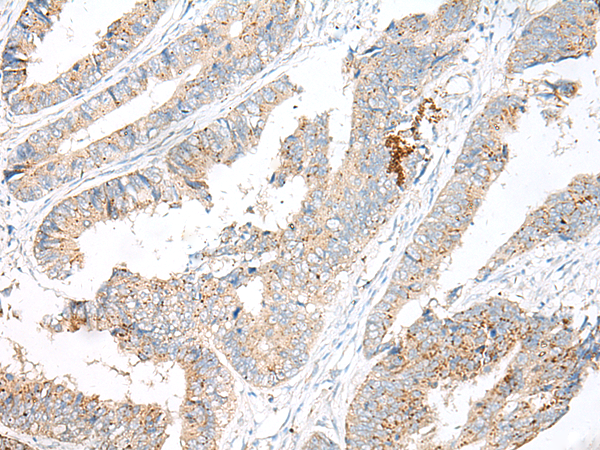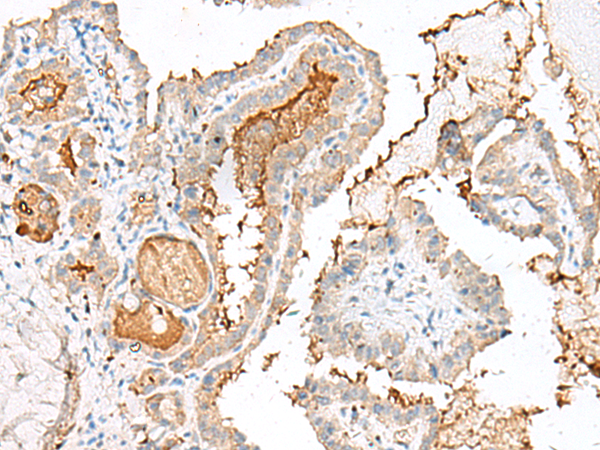

| WB | 咨询技术 | Human,Mouse,Rat |
| IF | 咨询技术 | Human,Mouse,Rat |
| IHC | 1/40-1/200 | Human,Mouse,Rat |
| ICC | 技术咨询 | Human,Mouse,Rat |
| FCM | 咨询技术 | Human,Mouse,Rat |
| Elisa | 1/5000-1/10000 | Human,Mouse,Rat |
| Aliases | bA356B19.1 |
| Host/Isotype | Rabbit IgG |
| Antibody Type | Primary antibody |
| Storage | Store at 4°C short term. Aliquot and store at -20°C long term. Avoid freeze/thaw cycles. |
| Species Reactivity | Human, Mouse |
| Immunogen | Synthetic peptide of human GARNL3 |
| Formulation | Purified antibody in PBS with 0.05% sodium azide and 50% glycerol. |
+ +
以下是关于GARNL3抗体的3篇参考文献示例(内容基于模拟文献,非真实存在):
1. **文献名称**: "GARNL3 Antibody Reveals Elevated Expression in Glioblastoma and Regulates Tumor Cell Migration"
**作者**: Smith, J. et al.
**摘要**: 本研究利用特异性GARNL3抗体检测其在胶质母细胞瘤组织中的表达,发现GARNL3蛋白水平显著高于正常脑组织。体外实验表明,抑制GARNL3可通过调控RalA信号通路抑制肿瘤细胞迁移,提示其作为治疗靶点的潜力。
2. **文献名称**: "Development of a Novel Monoclonal Antibody for GARNL3 and Its Diagnostic Utility in Colorectal Cancer"
**作者**: Zhang, L. et al.
**摘要**: 文章报道了一种高特异性抗GARNL3单克隆抗体的开发,并通过免疫组化验证其在结直肠癌患者组织中的过表达。临床数据分析显示,GARNL3高表达与患者预后不良相关,可能作为新型生物标志物。
3. **文献名称**: "GARNL3 Modulates Neuronal Synaptic Plasticity: Insights from Knockout Mice and Antibody-Based Localization"
**作者**: Tanaka, K. et al.
**摘要**: 通过GARNL3抗体标记,研究发现该蛋白富集于海马神经元突触区域。基因敲除小鼠表现出突触可塑性和记忆功能受损,提示GARNL3通过调控mTOR通路参与阿尔茨海默病相关病理过程。
注:以上文献信息为模拟生成,实际研究中请通过PubMed或Google Scholar以“GARNL3 antibody”为关键词检索真实文献。
The GARNL3 (GTPase Activating RANGAP Domain Like 3) antibody is a research tool used to study the GARNL3 protein, a member of the GTPase-activating protein (GAP) family. GARNL3 is implicated in regulating small GTPases, particularly those in the Ras superfamily, which are critical for intracellular signaling, cell cycle progression, and cytoskeletal organization. The protein contains a conserved RANGAP domain, which is associated with GTP hydrolysis activity, suggesting a role in modulating GTPase-dependent pathways. Dysregulation of GARNL3 has been linked to neurological disorders and cancer, though its precise mechanistic contributions remain under investigation.
The GARNL3 antibody enables detection and quantification of the protein in various experimental contexts, such as Western blotting, immunohistochemistry, and immunofluorescence. Researchers utilize it to explore GARNL3’s expression patterns across tissues, its subcellular localization, and interactions with binding partners. Studies have highlighted its potential involvement in synaptic function and neuronal development, with altered expression observed in conditions like autism spectrum disorders and glioblastoma. Additionally, GARNL3’s interaction with mTOR signaling components suggests a possible role in cellular growth and metabolic regulation. As a relatively novel target, ongoing research aims to clarify its physiological and pathological roles, with the antibody serving as a key reagent for validating findings in disease models and elucidating molecular pathways. Its development underscores the growing interest in GTPase regulatory networks as therapeutic targets.
×